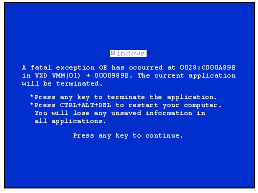| In a break from our usual format, Editor-in-Chief R. Pell () and Senior Editor Rodney Myrvaagnes () agree to disagree about the merits of the Microsoft antitrust case. (This article appears in print in two parts, in the Viewpoint section of the May and June issues of Electronic Products Magazine.)

With the recent guilty verdict in the government's antitrust case against Microsoft, the software giant's plans to expand its dominance in the PC industry have suffered a glitch–a phenomenon not unknown to users of its operating system. Was the ruling justified? R. Pell: As expected, the recent ruling in the Microsoft antitrust trial has found that the software giant illegally used its “monopoly” position in the marketplace to harm both competitors and consumers–a conclusion for which I see little evidence. In fact, I think the case, which presumes that government lawyers and regulators are qualified to set the direction and pace of technology, represents an ominous development for the technology industry. Rodney Myrvaagnes: I don't see that it presumes anything of the kind. Lawyers present evidence to courts that they hope will be convincing. In this case, they were pointed to the evidence by parties at interest, of course, but that is almost always true. RP: Well the “parties at interest” just happen to be some of Microsoft's competitors, who seem to be trying to achieve politically–at taxpayer expense–what they couldn't in the marketplace. And you can be sure they don't have consumers' best interests at heart. If a company has a legitimate dispute with another, then it should address the matter in a private civil suit instead of colluding with the government in a case based on laws that are more about politics than economics and consumer interests. RM: The Sherman Act has been with us about a century. Like all laws, it was a political response to a politically perceived problem, and the political process has the right to repeal it. It is on the books now, so using it is at least as legitimate as the Microsoft practices at issue. To say tiny companies “should” take on Microsoft unassisted if they don't have to is like saying Microsoft “should” compete with better products. All parties will do what they can at the least cost. And, competitors weren't the only victims. Microsoft abused computer OEMs as well. RP: I see a big difference between competition in the marketplace–where consumers decide the winners and losers–and competition in the political arena, where politicians, lawyers, and lobbyists declare the victor(s). Should a company's success depend more on how well it is able to influence politicians than on the products it produces? RM: Its products, for sure. But, quality of products has not driven Microsoft's success for many years. It currently wields power well beyond that of any bureaucrat and has used that power to set the direction and slow the pace of technology, by squashing innovators whenever they got near. RP: I disagree. Microsoft has achieved success by serving the needs of the marketplace. Like any company it has done its best to differentiate its products and create its own standards. That some of these have been adopted by the market is hardly an indictment. In fact, by becoming a de facto standard, Microsoft has brought untold benefits to industry and consumers by reducing hardware/software costs and speeding the development of applications. RM: The standards that have brought us the PC industry were developed accidentally by IBM and (later) deliberately by Intel. There is no evidence that the changes in the Win32 interface that came with Windows 95 had any purpose other than to prevent the operation of some software. RP: And even if they did? After adopting Windows, the PC industry has seen an enormous expansion, with unprecedented levels of competition and innovation that continue today. It's hard to see how anyone can claim that the industry has been hindered–much less harmed–in any way. And regardless of the reasons Microsoft may have for making specific changes to its products, it has every right to do so. How arrogant of government bureaucrats to presume to tell a company how to design its products! RM: We cannot know, of course, whether the growth of the PC industry would have been greater or less than it was had Microsoft's business practices been different. But the companies that Microsoft drove under attracted the unwelcome attention by producing potentially more-marketable products, not worse ones. RP: Microsoft–like any successful company in a competitive environment–responded to what it perceived as threats to its market share. That it was successful in some instances should in no way automatically imply the use of unfair or illegal practices. In fact, it was only by branding Microsoft a monopoly–a stretch of the term by any reasonable definition–that the government was able to label the company's actions “illegal.” RM: A stretch? Microsoft responded to perceived threats by damaging others, including its customers, rather than by improving its products. No one in this case has taken any “automatic” implications. The Department of Justice (DOJ) had to prove its case. Microsoft has been labeled a monopoly only with respect to operating systems, not applications–not such a stretch to someone who has had to buy Windows willy-nilly.
RP: Any successful company can be accused of “damaging” its competitors, so a case can't be built on just that. And in order to make their monopoly charge stick, the DOJ lawyers not only had to narrow the relevant market to “Intel-based PC desktop operating systems” (conveniently ignoring millions of Macintosh users), but dismiss valid alternatives–like OS/2, BeOS, and Linux (among others)–out of hand. We both know how silly that monopoly charge really is, given that we each use Linux on our home and notebook PCs!

While they disagree on just about every aspect of the Microsoft antitrust decision, Editor-in-Chief R. Pell and Senior Editor Rodney Myrvaagnes both see the Linux operating system (shown here) as a promising alternative to Windows. RM: There are competitive measures that anyone can take, and there are those that got Microsoft in the dock–those only a company that considered itself a monopoly could hope to get away with. Indeed, the situation is beginning to change. The open-source phenomenon represents a so-far endless source of targets too small to be swatted, rather like the Pekinese dogs bred for tiger hunting. And, I really hope that Linux will become an easy-to-use and complete desktop solution. It is not there yet for me. As soon as it is, there will be no more dual boots in my home. RP: I still think there's a difference between having a dominant market position and being a monopoly–a distinction that appears to have been lost in the anti-Microsoft feeding frenzy. In the meantime, the market isn't waiting for the courts to decide Microsoft's fate. Like you, I'm encouraged by the industry's steps toward more open-source–as opposed to proprietary–standards. Let's hope that politicians don't decide that the open-source movement–with its “anticompetitive practices” and “predatory pricing”–is an industry threat! RM: The distinction between a dominant company and a monopoly was one of the issues the judge had to decide on the evidence. Judges do make mistakes, but I don't think this decision was one of them. I expect that time will make this all irrelevant, but “in the long run, we are all dead.”
|







